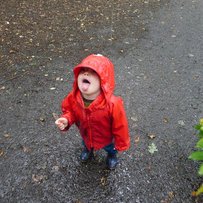 Written by Clare Caro If I started talking about something as being miserable, horrid, ghastly or awful - what sort of picture am I painting about this 'something'? Many of us unconsciously talk about nature in this negative way. More specifically, many of us talk about the weather and what its like to be out in it in this way. While we are saying to our children, "It's a miserable day out there", what sort of information are they getting from us about nature when it rains, when it is cold, windy or overcast? What do they make of us when we follow it up with, "Lets get outside then"... outside into that which we have just described with unpleasant words and a frown? No wonder some of our children don't want to get out in all weathers. They are hearing 'crossed wires'. We are our children's models. The language we use with them and around them has an impact on them. When we start to notice how we have been talking about outside experiences, its easy to see how the above emotive words might not be helpful in fostering a love of nature in all weathers. How can the rain be miserable and the cold be horrid? The truth is, it can't. We can replace these emotive words with descriptive words: It is drizzling, wet, brisk, cold, blusterous or windy. It doesn't matter whether your child experiences the day outside as exciting or miserable, but it matters that we allow them to feel how a day in the rain was for them. And watch your vocabulary as you talk about it with them. When we progress past the 'miserable, ghastly, horrible, awful' words we have been using, we too can start to see and talk about the magic of the seasons. We can note the differences between spring and autumn, and we can discuss how we will dress to keep warm when it is blusterous and tipping down. That way we start to pass on information that is useful to young nature lovers. ...take me back to the A R T I C L E S menu. Comments are closed.
|
|
Copyright © 2024 Nature Play
|

 RSS Feed
RSS Feed